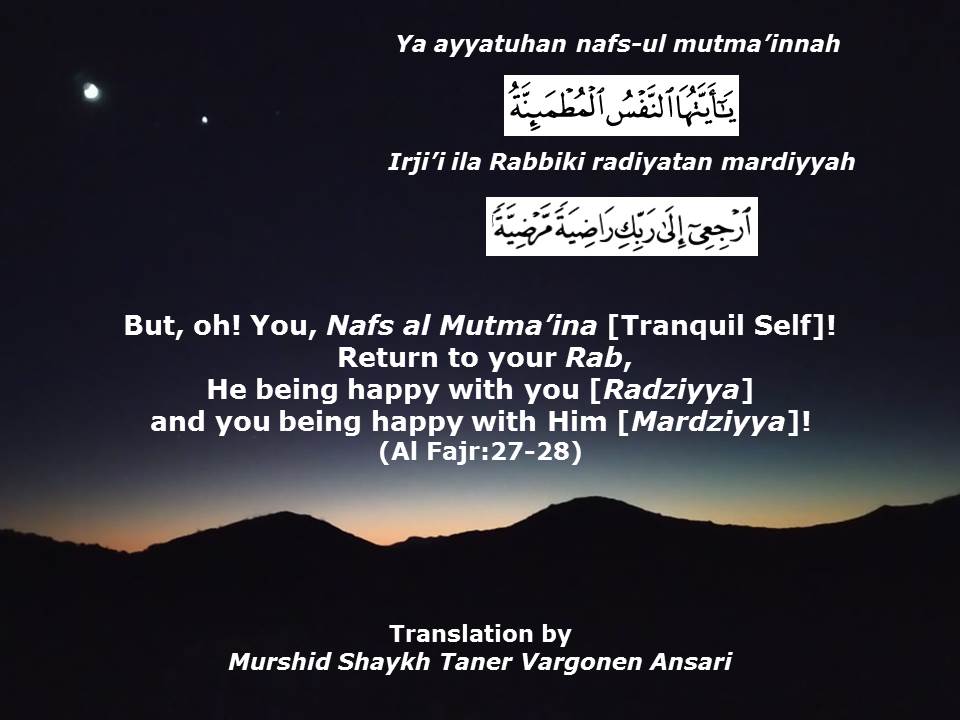Balance
People always ask, “What do you want me to do? What am I going to do? What shall I do? What is the correct course?”
The answer is within yourself
If you look at your body when you are born, normally you have balance until you inherit this nafs [ego] gradually, and then siding with nafs imbalances it.
You have a skeleton to keep the flesh up. You have flesh and muscles to form a shape for your body in relation to the skeleton. You have a cover/skin and then you have five senses placed just right. Even if you were an artist drawing pictures, you will see that everything is proportionate. You have this nervous system that gives the brain information about whatever is happening in the body. You have a life support system – breathing, eating and sheltering, etc. The summary of what you are going to do is already in your body.
And for each person, We have tied what they are supposed to do on their neck as a sign for them, and on the Yawm al Qiyamah [Day of Resurrection] We will bring out a book, which they will find openly shows everything (they have done). (Al Isra:13)
Your brain wants to learn and later on it realizes that whatever it is learning is Allah. Your heart wants to choose Allah and His rights and wrongs (some call it conscience). Your nafs wants to do the opposite of it, with no rules or regulations — “There is only one rule – it is ‘my’ rule.” Your lungs breathe in and out doing zikr and your voice box, in co-operation with your breathing, does the vibration of what we call zikr.
What is our duty?
Our duty is to keep this machine working as planned and balanced in our lives. First, we have to come to the decision that we must acknowledge the Creator, and then know what He wants from us and intend to do it. What He says are right and wrong is what we call legal knowledge, which is sharia. Sharia is not only an Islamic terminology. It is also Christian and Jewish. It is all knowledge of what to do for Allah.
For each (of the people of the Book) We have appointed a sharia [divine law], and have showed a way of life and action. (Al Ma’ida:48)
Sharia is like the backbone of our skeleton — you cannot go anywhere or any level without your skeleton. You have to know what it is and intend to do or not to do as Allah wants to keep the balance.
Keywords
din: way of doing righteous deeds; way of life; right path of connectedness with Allah; way of relationship with God; system of actions that establish a connection to and relationship with Allah
nafs: lit., breath; self; person; egoistic or animalistic nature; personal life
sharia: the body of Islamic religious canons; injunctions attributed to Prophet Muhammad (peace be upon him) regarding proper behavior for Muslims; proper behavior; commandment; law
tariqa: path; Sufi order
zikr: remembrance; repeated remembrance with contemplation; mentioning Allah’s name repeatedly with intention and contemplation, glorification or supplication; reminder; the practice of repeating the names of Allah; litany of remembrance
The seven main levels of nafs attained in the process of Sufi purification
1. Nafs-i Ammara, Nafs al Ammara: Dominant Self
2. Nafs-i Lawwama, Nafs al Lawwama: Blaming Self
3. Nafs-i Mulhama, Nafs al Mulhama: Inspired Self
4. Nafs-i Mutma’ina, Nafs al Mutma’ina: Tranquil Self
5. Nafs-i Radziyya, Nafs al Radziyya: Satisfying Self (heart is happy)
6. Nafs-i Mardziyya, Nafs al Mardziyya: Satisfied Self (brain is happy)
7. Nafs-i Safiyya, Nafs al Safiyya: Purified Self
This is an excerpt of the Online Saturday Sohbet given on June 4, 2016 by Murshid Shaykh Taner Vargonen Ansari, published in the Call of the Divine on June 13, 2016 and edited for this article on August 24, 2020. The translation of the Qur’an verses and keywords are from Murshid Shaykh Taner Vargonen Ansari.
Do you have any questions?
Subscribe to the Aqrtsufi YouTube Channel and be notified to join our interactive Live Q&A and Zikr!

